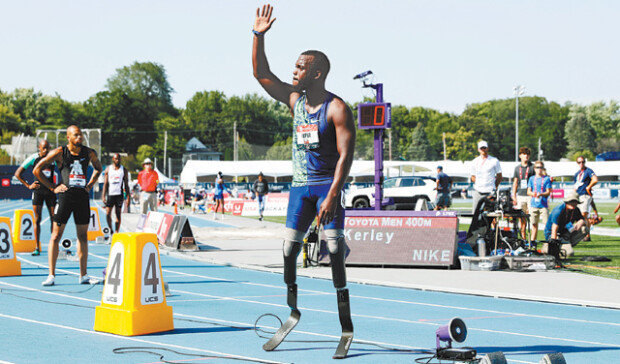Will runners with prosthetic legs compete again?
Will runners with prosthetic legs compete again?
Posted November. 06, 2020 07:52,
Updated November. 06, 2020 07:52


To what degree can equipment be allowed for use at the Olympics?
There has been a constant debate on the fact that equipment’s performance should not be prioritized over human capabilities at the Olympics. One of the representative cases regarding the debate is the Lugano Charter announced by the Union Cycliste Internationale in 1996. The charter was put forward to prevent excessive competition for the development of “super bicycles” among the U.K., the U.S., etc. to win Olympic medals with an astronomical amount of money.
The charter states that the frame of an Olympics-eligible bicycle should be a traditional triangle shape and their weight should be over 6.8 kilograms. It was meant to restrict bicycles made of specialty materials to make them lighter and in shapes to make them more aerodynamic. Such measures prevent countries without resources to develop advanced bicycles from falling behind in equipment competition and pulling out of the Olympics. It is in line with the banning of full-length swimsuits, which swept over the world, by Federation Internationale De Natation (FINA).
However, the opponents of such measures argue that technological advancements should be applied to sports. These days, even “wearable” devices are available. Once some devices become an essential part of the human body with more technological development in the future, would it be still justified to ban the use of the devices in competition?
Such potential foreshows the subdivision of sports’ identities and regulations. Scholars believe that if the current trend persists sports will be divided into “natural men’s competitions” and those that allow wearable devices. However, some will not be divided so clearly.
Before Blake Leeper was barred from competing for his use of prosthetic legs, another Paralympic athlete Oscar Pistorius competed at the 2012 London Olympics using prosthetic legs. While the results are opposite, it is clear that athletes with prosthetic legs are making more attempts to be qualified for the Olympics.
It is notable that the Court of Arbitration for Sport, although did not allow Leeper to compete at the Tokyo Olympics, said to World Athletics that clear regulations and environment should be created to allow disabled athletes to compete with others. The days that the disabled and the able-bodied compete together based on technological development are coming.
Won-Hong Lee bluesky@donga.com







